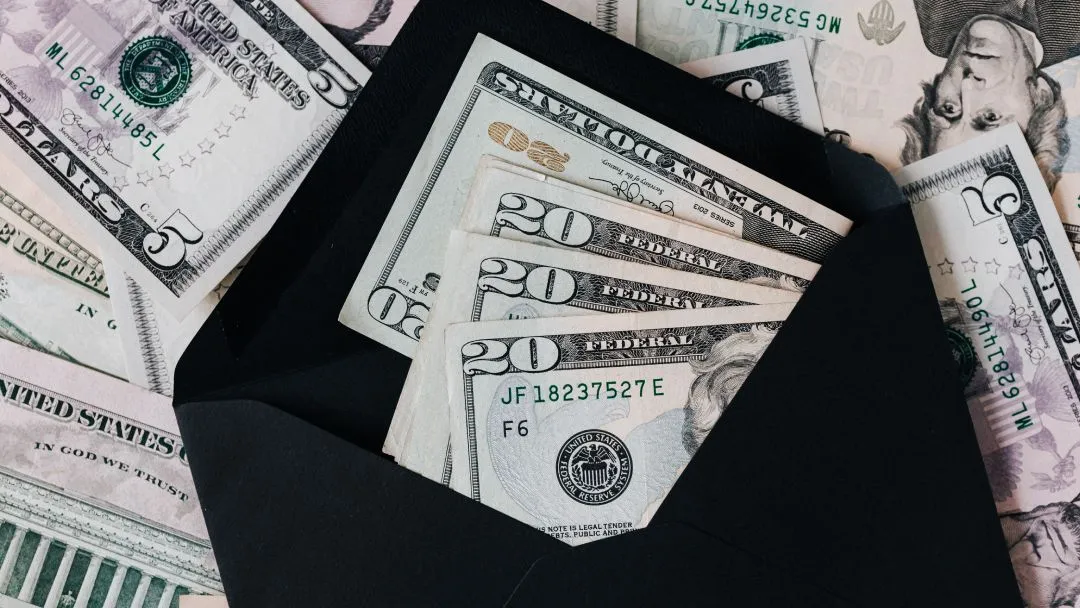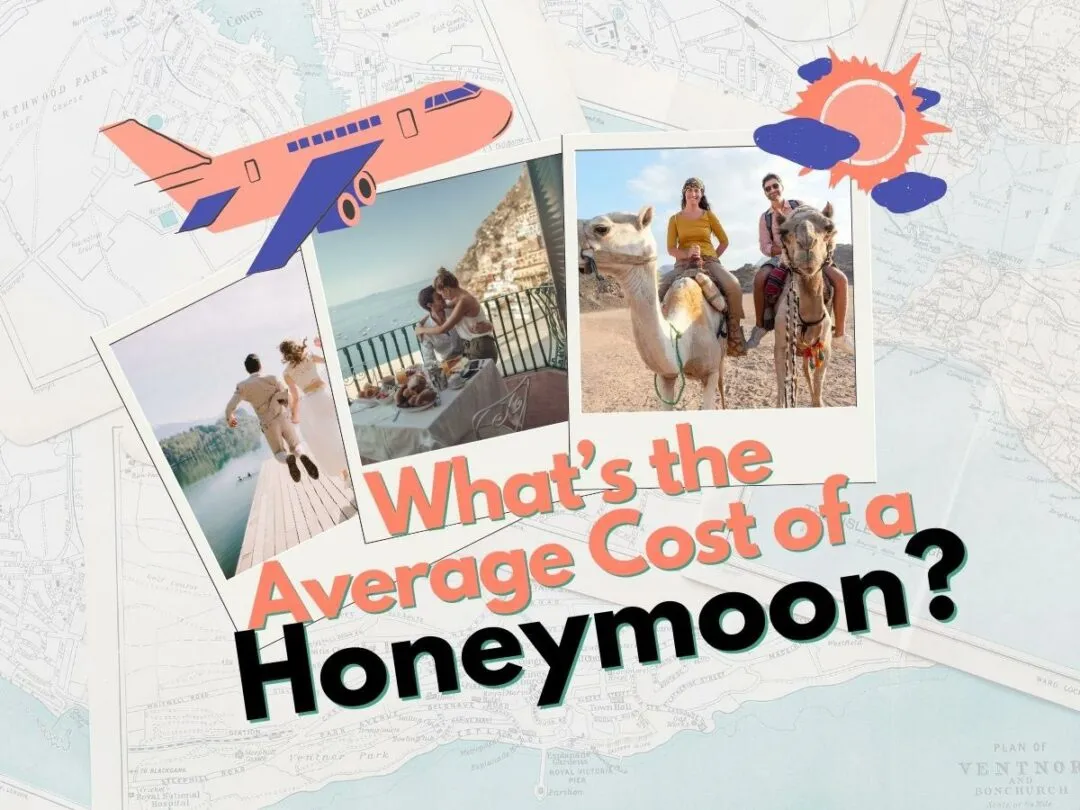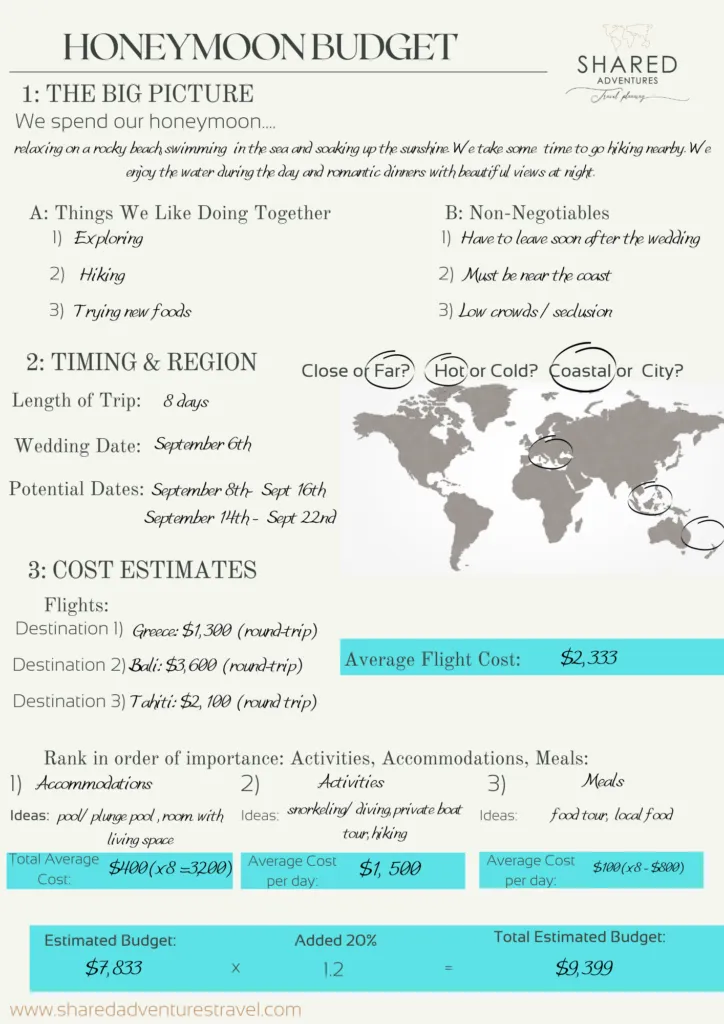Understanding the Average Honeymoon Budget
Planning a honeymoon is an exciting time, but it also involves careful financial consideration. Knowing the average honeymoon budget is a crucial first step. The cost of a honeymoon varies significantly based on several factors, including the destination, duration, and the couple’s spending habits. In this guide, we’ll break down the key components of a honeymoon budget, helping you understand where your money goes and how to plan a trip that fits your financial goals. Whether you’re dreaming of a luxurious getaway or a budget-friendly adventure, understanding the average costs will allow you to make informed decisions and create unforgettable memories without breaking the bank. This comprehensive guide will provide you with the insights and tools needed to navigate the financial aspects of your honeymoon with confidence.
Factors Influencing Honeymoon Costs
Several factors contribute to the overall cost of a honeymoon. Understanding these elements will help you adjust your plans to meet your budget. The destination, duration of stay, and the type of accommodation are some of the primary influencers. Additionally, transportation expenses, including flights and local travel, and the activities you choose to undertake will impact the final cost. Food and dining, along with any unexpected expenses such as travel insurance or visa fees, should also be considered.
Destination Choice and Its Impact

The location you choose significantly impacts the honeymoon budget. Popular destinations like the Maldives, Fiji, or the French Riviera tend to be more expensive than locations in Southeast Asia or parts of South America. Researching the cost of living and travel expenses in different regions is crucial. Consider the season as well; traveling during peak season will increase prices, while the off-season may offer more affordable options. For example, a week-long stay in Bali might cost significantly less than a similar trip to a luxury resort in the Caribbean, even accounting for flights.
Length of Stay and Its Effect
The number of days you spend on your honeymoon has a direct correlation to your budget. Longer trips will inevitably cost more due to increased accommodation, transportation, and activity expenses. While extended honeymoons offer more opportunities for relaxation and exploration, it is vital to balance your desire for a long trip with your financial constraints. Consider a shorter, more affordable trip to a dream destination or divide your honeymoon into phases to spread out the costs. Carefully assess how many days you can allocate for your honeymoon and plan accordingly.
Accommodation Costs
Accommodation expenses form a significant portion of your overall budget. The type of lodging you choose, whether it’s a luxury resort, boutique hotel, Airbnb, or a budget-friendly hostel, will impact your costs. Resorts and hotels often include added expenses for food and activities. Consider the amenities available and compare prices to find the best value. Booking in advance can also secure better rates. Exploring alternatives like Airbnb can offer more affordable options, especially for longer stays, while providing the opportunity to experience local culture.
Transportation Expenses

Transportation costs include flights, local travel, and transfers. Flights often represent a considerable expense, so it’s wise to compare prices from various airlines and consider flying during the off-peak season for lower fares. Booking flights well in advance can also help you secure better deals. Local transportation expenses such as taxis, rental cars, or public transit will vary depending on your destination. Consider the convenience and cost-effectiveness of different transportation options to minimize spending. Think about booking airport transfers in advance to avoid inflated prices.
Flights and Travel
Flights are a major expense, so researching and comparing prices from different airlines is essential. Consider flying during the off-season or mid-week to find lower fares. Utilize flight comparison websites and set price alerts to track potential drops in prices. Also, think about the distance to the airport from your home, as well as the additional costs associated with airport parking. Direct flights are usually more expensive, so be open to connecting flights to save money. Booking flights in advance is one of the best ways to save money on your honeymoon.
Local Transportation
Local transportation costs can vary greatly depending on the destination. Public transport such as buses and trains are often more affordable than taxis or private cars. In many destinations, ride-sharing services offer a cost-effective alternative. Renting a car provides flexibility but may incur extra expenses for fuel and parking. Consider the practicality and cost of different transport options, such as walking, biking, or public transport, to minimize your expenses. Research local transportation options before you travel to create an accurate budget.
Activities and Entertainment

The activities and entertainment you choose for your honeymoon also influence the overall cost. Activities can range from free options like exploring beaches and parks to costly excursions such as guided tours, adventure sports, and exclusive experiences. Research and prioritize activities that align with your interests and budget. Look for packages that combine activities, or explore free or low-cost alternatives. Be mindful of additional expenses, like entrance fees or equipment rentals. Book in advance when possible, and consider purchasing city passes that offer discounts on multiple attractions.
Dining and Food Expenses
Dining expenses can fluctuate greatly depending on your eating habits and the location. Eating out every meal can quickly add up, particularly in tourist hotspots. To manage costs, consider a combination of restaurant meals and self-catering options. Look for local eateries, food markets, and street food, which are usually more affordable than fine dining establishments. If your accommodation includes a kitchen, preparing some meals can save money. Also, check if your accommodation includes breakfast or other meals, reducing your expenses. When eating out, consider sharing dishes or looking for set menus to reduce the cost.
Hidden Costs to Consider
Beyond the obvious expenses, several hidden costs can impact your honeymoon budget. These often include travel insurance, visa and passport fees, gifts, and souvenirs. It is crucial to account for these potential expenses to avoid budget overruns.
Travel Insurance

Travel insurance is an essential, often overlooked cost. While it may seem optional, travel insurance can provide coverage for unexpected events such as medical emergencies, trip cancellations, lost luggage, and other unforeseen circumstances. Choose a policy that covers the specific risks of your destination. Researching different providers and comparing policies will help you find the best coverage at a reasonable price. It is a wise investment to safeguard you against potential financial losses.
Visa and Passport Fees
Before you travel, ensure that your passports are valid and that you have the necessary visas. Visa fees can be significant, depending on your destination and the duration of your stay. Apply for visas well in advance to avoid rush fees. Check your passport’s expiration date and ensure it is valid for at least six months beyond your return date. Factor these costs into your budget, and don’t let last-minute surprises disrupt your honeymoon plans.
Gifts and Souvenirs
Allocate a portion of your budget for gifts and souvenirs. While itu2019s tempting to buy many items, stick to a realistic spending limit. Consider setting a budget for gifts and souvenirs before you travel and try to stay within those limits. Look for locally made products or unique items that reflect your travel experience. Comparing prices in different shops can help you save money, and avoid impulse purchases by planning what you wish to purchase in advance. Consider sending postcards, or experience gifts, which often are more meaningful.
Creating a Realistic Honeymoon Budget

Developing a realistic honeymoon budget requires careful planning and research. Start by defining your financial limits. Calculate how much you can realistically spend without incurring debt or compromising your long-term financial goals. Use budgeting tools, research costs, and prioritize expenses. A well-defined budget ensures that your honeymoon is both memorable and financially sustainable.
Setting a Budget and Sticking to It
Start by listing your income and expenses to understand your financial situation. Then, set clear spending limits for each category: accommodation, transportation, food, activities, and other expenses. Use a budgeting app or spreadsheet to track your spending. This will help you identify areas where you can save money and ensure you stay within your budget. Regularly review your budget to make adjustments if necessary. Communication with your partner about your budget is also crucial, ensuring both partners are aware of and committed to your financial plan.
Using Budgeting Tools
Utilize budgeting tools to assist in creating a detailed and manageable budget. Several apps and websites offer features to track spending, set financial goals, and monitor your progress. Popular options include Mint, YNAB (You Need A Budget), and Personal Capital. These tools allow you to categorize expenses, set alerts for overspending, and analyze your financial behavior. By using such tools, you gain a clearer understanding of your finances. Budgeting spreadsheets, such as those in Google Sheets or Excel, can also be effective. Select the tools that best match your needs and your comfort level.
Saving Tips for Your Honeymoon

Implementing smart saving strategies can help you achieve your dream honeymoon without overspending. There are various ways to reduce costs and maximize your savings, from prioritizing your spending to planning your trip in advance. Saving money can mean choosing budget-friendly options for different aspects of your honeymoon or considering alternative destinations. Creating a comprehensive plan will help you to maximize your budget while making the most of your experience.
Prioritizing Spending
Assess your priorities and focus your spending on the experiences and activities that matter most to you. Consider what you value most during your honeymoon. Are you more interested in luxurious accommodations or unique activities? Prioritize those aspects and cut back on less important expenses. For instance, you can save money by opting for affordable dining choices and allocate those savings to a once-in-a-lifetime experience. Align your spending with your preferences and create a budget that reflects your values.
Exploring Cost-Effective Destinations
Choosing cost-effective destinations can significantly impact your budget. Research destinations that offer value for money. Southeast Asia, South America, and parts of Eastern Europe often provide affordable accommodations, food, and activities. Compare the cost of living and travel expenses in different locations. Consider less-traveled destinations, which might be more affordable. Doing proper research and being flexible with your destination can help you save money without compromising the quality of your honeymoon.
Planning in Advance
Planning your honeymoon in advance offers numerous advantages. Booking flights and accommodations early can often result in significant savings. Advance planning allows you to take advantage of early bird discounts. Start saving as early as possible. Create a separate savings account specifically for your honeymoon to keep track of your progress. Planning ahead allows you to create a detailed budget, secure better deals, and avoid last-minute expenses. This ensures a less stressful and more financially sound honeymoon.
Conclusion
Planning a honeymoon can be a delightful process when handled with careful planning and budgeting. By understanding the average honeymoon budget, considering all the potential costs, and using smart saving strategies, couples can create a memorable and affordable experience. Remember that a well-planned honeymoon allows you to enjoy your first adventure as a married couple without financial stress. Take the time to research, set a budget, and prioritize your expenses, and you’ll be on your way to an unforgettable honeymoon.
